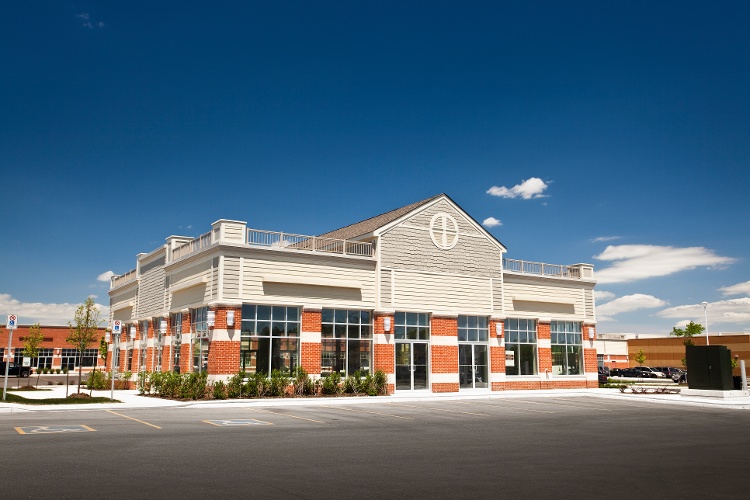Stocks.
Bonds.
Mortgage Notes.
Crypto.
Oil.
The list of investment options in this world could go on for another 98 pages. But, I’ll stop right there and focus on my favorite investment strategy of them all:
Residential Real Estate Investing.
I’ve been investing in real estate for a few years and am often reminded that this industry is ever-changing and evolving. But, there are key foundational facts about residential real estate that will always stay constant.
Residential vs. Commercial Investing
Before we focus more on residential real estate investment, let’s dive a level deeper and touch on the commercial side of things and compare it to residential.
Commercial

Commercial Real Estate (CRE) is used for office, retail, and industrial. Simply put, it is real estate used in commerce and for business purposes.
One of the first things to note is that there are multiple class types within CRE, each requiring detailed knowledge of this type of asset. Specific rules and regulations apply depending on county and state.
What’s awesome about commercial real estate is you can typically lock in longer lease terms than you can for residential properties. For example: 5-10 year leases in this space are not uncommon. That means consistent monthly income and lower vacancy rates. Cash flow stability is amazing! Cha-ching!
Even though there may be less tenant turnover, it can be much more costly when you have to find a replacement for a tenant. Why? Some tenants may require specific layouts and features in the space, requiring more renovations and larger capital expenses.
Bottom line: CRE is considered high-risk, high-reward in the real estate world.
Residential

Want to know an interesting advantage to Residential real estate? Shorter leases aren’t necessarily a bad thing.
Think about this: if market conditions change in the landlord’s favor, you’ll have more control and the opportunity to increase rents with a shorter lease. With CRE, you may need to wait 10 years to take advantage of a booming rental market and re-evaluate your lease terms.
Residential is also usually less sensitive to economic conditions. People will always need a place to live, but will people always need to go to the yoga studio that is your tenant? That business may not survive an economic crash when people have less disposable income.
You’re going to need money one way or another in real estate. Here’s the great thing about Residential: it’s easier to get financing. 15-30 year loans are available and everywhere. When compared to CRE, most loans are amortized for less than 30 years with a required balloon payment … which means you’ll probably have to pay off the entirety of the loan within 5-10 years.
Residential is one of the most affordable real estate investments. I mean, just look around the Roofstock Marketplace, and you can easily find quality, cash-flowing properties for less than $100k.
With a 20-25% down payment and a tenant to pay off your mortgage, the barrier to entry is not too high. And the ability to look outside of my home market (San Francisco) means I can find opportunities that are much cheaper!
There’s no right or wrong answer to the question, “Should I invest in residential or commercial real estate?” It comes down to your risk tolerance, knowledge, and the team and network you can leverage and work with.
Here are 11 Must-Know Facts about Residential Real Estate Investing

Now that you understand the difference between residential and commercial investments, here are some of the facts you need to know in order to successfully invest in residential properties.
1. There are plenty of tax advantages
Investing in residential real estate comes with numerous tax advantages. You can factor in deductions such as property depreciation, mortgage interest, the cost of repairs/maintenance/services, travel costs, meals, and even defer capital gains tax through the use of a 1031 Exchange.
As always, different people have different tax situations, so be sure to consult your tax professional regarding your personal financial picture.
2. You have more control than you think
Bottom line: You select the market to buy in. You only buy a property if you’re happy with the acquisition price. You agree on a rehab budget. You hire a property manager. You and your property manager select tenants. You decide to hold or sell.
These are just a few factors in residential real estate where you have full control over your investment’s destiny.
Obviously, not everything is guaranteed and roadblocks will come up, but this is a special asset class where you have a ton of control.
3. The value is in consistent monthly cash flow
Buy and Hold residential investing is beautiful once your property is performing. You mortgage payment goes out, rental income comes in, and hopefully it becomes clockwork on the 1st of every month. It’s like getting a monthly paycheck without having to work in a cubicle! Isn’t that what you want?
*NOTE: always have cash reserves for when those pesky repair expenses come up*
4. Tenants control cash flow and ROI

Not so fast though...related to the previous point I made, this may seem obvious, but without a tenant you literally have no cash flow. What does that mean? Tenant class is extremely important. Picking the best and most responsible tenant possible (easier said than done) is arguably the most important factor when investing in residential real estate.
5. Appreciation
I’ve called this the “icing on the cake” in a previous post I wrote about ROI, and if you’re a buy and hold investor with assets in a cash flowing market, it truly is.
First things first, your properties should appreciate at least as fast as inflation (~2% annually) which is better than the interest rate on most savings accounts. As a bonus, if you’re in a growing market like Atlanta or Indianapolis you should be able to tack a few more percentage points on annually.
6. Loan pay down
The amazing thing that some new investors fail to realize when looking at ROI, is the fact that when your property is occupied and cash flowing, your tenant is paying down your principal, interest, taxes, and insurance for you. It’s great! So, even if your property “breaks even” one month due to unexpected repairs or maintenance, you still have someone else paying a majority of your expenses. How is that not amazing?
7. Creative financing options
Pay all cash or get a traditional mortgage? You may think those are the only two options available for buying residential real estate. Luckily, there is a diverse range of additional financing options. Seller financing, getting a loan from a self-directed IRA, private loans, master lease with option to buy … these are just a few creative ways to finance your next investment.
8. Location is critical

Location, location, location … you hear that all the time, because it’s true! I used to think that if the numbers on paper looked great, the investment was a no-brainer.
Then I got first-hand experience in having an unqualified tenant because my property was in a bad neighborhood. The location of that particular property attracted a certain type of tenant class, someone who may not have been in the greatest financial position to keep up with rent payments.
Now I understand the importance of location and the type of tenant the location attracts. Keep this in mind when looking at residential rental property!
9. It’s a long game
Unless you’re a house flipper, buy and hold real estate investing is a long-term strategy. You need to start thinking about your life and portfolio 5-10 years in the future.
One house, two houses, or five houses are not going to make you rich overnight, but if you keep building your portfolio year after year, and you keep letting inflation do its work, and you lock in fixed mortgages, you’ll eventually reap the rewards of this long-term strategy.
If you have 0, 1, or 2 units right now, you’re still in the 1st inning of a 20 inning game. Game on!
10. Management is required
I’m guessing you’re not here reading this article to buy one house, and then exit. You want to grow a portfolio that eventually supports your lifestyle. I get it. Same here.
With that type of scaling, especially if investing out-of-state, you need strong management to oversee your portfolio. Always, always, always have thoroughly vetted and experienced property managers ready to oversee everything.
11. Expect the unexpected
Don’t have a mindset where you always expect the worst, but do always proactively think about challenges that could pop up. Getting started in the investing world and gaining firsthand experience is the best advice I could give anyone.
Things will pop up: a tenant may stop paying, fluke repairs will hit your bottom line, insurance rates may go up. Having plenty of cash reserves is one way to combat the unexpected. Luckily, Roofstock helps in the residential space in all aspects of acquisition, due diligence, and property management.
These facts and benefits are the foundational reasons why I invest in residential real estate. I’m showing no signs of slowing down anytime soon and will continue to grow my portfolio.
Now, it’s your turn to start building your financial future!
BONUS: Check out this webinar we recently recorded on How to Build an Effective Real Estate Investing Plan.









